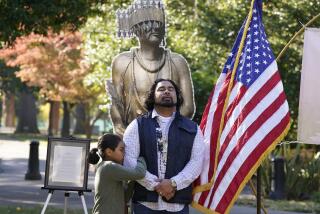Manager Vows to Save Bingo, Rincon Image
VALLEY CENTER — Managing an Indian bingo operation these days may seem to be about as much fun and professionally fulfilling as, say, flying helicopters that dump sand on burning nuclear power plants. It may seem to be a go-nowhere career at best, given the track record of some bingo operations at Indian reservations in San Diego County.
So what possesses a former federal bank examiner and deputy district attorney to invest $250,000 on May 31 to resurrect a bingo operation that flopped last June amid complaints of unpaid prizes and salaries?
Saul Wright says he is convinced that, by taking some of the expensive and sensational frills out of Indian bingo, he can make money for both himself and the Rincon Indians while injecting a sense of integrity and honesty into the tainted games.
“There are PR (public relations) challenges because of the negative images about some Indian bingo games,” he said. “But we’re going to show that you don’t have to rip anybody off to make a profit in this business.”
This pledge comes in the wake of not only the Rincon tribe’s troubled games--the former bingo manager said he took an $800,000 loss--but the Barona Indians’ court fight with their management company over alleged breach of contract.
The highlight of Barona’s bingo woes was the courtroom confession of Stewart Siegel, the former general manager, that he rigged several games so that $96,000 in jackpots went to shills--predetermined winners he planted in the audience and with whom he later shared the prize money.
Siegel pleaded guilty to four of six counts of grand theft; authorities originally had accused him of steering $139,000 in prize money to his accomplices at the expense of legitimate bingo players who would have won the money.
Since then, Barona Indians have filed a lawsuit accusing American Management and Amusement Co. of keeping two sets of books, not paying its fair share of expenses and buying bingo equipment without the tribe’s approval.
There were no formal accusations of criminal wrongdoing at Rincon, but several bingo players complained a year ago that they were never given the automobiles they had won. The former bingo manager at Rincon, Charles G. Schlegel, said Rincon bingo was doomed by a poor cash flow brought on by competition from other high-stakes Indian bingo games elsewhere in Southern California and because he was paying local Indians too much money to work at the local bingo hall.
Simply put, Schlegel said, there were not enough players spending enough money night in and night out to meet the expenses of the operation.
Wright said that is where he’ll turn things around. He will reduce wages by about half, offer attractive--but not excessive--jackpots, reduce promotional costs and run a daily accounting of the cash flow so there will be no surprises for him or the Indians, he said.
Wright was chosen by the Rincon tribe 10 months ago, from a field of seven bingo manager candidates, to resurrect the games. Tribal chairman Max Mazzetti said Wright was chosen “because the background record on this fellow seems good, and because, when you talk to him, he looks at you straight in the eye and tells it like it is. We have confidence in him. He’s honest, from A to Z.”
The management contract between Wright and the tribe was approved recently by the federal Bureau of Indian Affairs, and one bureau official described it as “a model contract” that can serve as an example to other tribes and management companies.
“You learn as you go,” Mazzetti said of the Indians’ decision to give bingo another chance under new management.
Wright, 46, recently moved from Leucadia to Valley Center to be close to the bingo hall and incorporated Southwest Indian Consultants Inc., of which he is the sole stockholder.
He served as a national bank examiner for the U.S. Treasury Department and served as a trial lawyer for the district attorney’s office in San Diego for about three years before turning to private practice in Oceanside and Carlsbad in 1970, he said. More recently he moved into commercial real estate work, and he was intrigued “by a bingo building sitting empty” on the Rincon reservation, 16 miles northeast of Escondido.
“It had unusual investment possibilities,” he said. “I really feel we can make a profit, not only for the tribe but for myself.”
Over the course of 30 bargaining sessions spread over a 10-month period, he negotiated a contract with the tribe that called for him to pay the Indians $6,600 a month for the use of the 1,800-seat concrete-block bingo hall, regardless of whether the games turn a profit.
The rent represents pure profit to the Indians because the hall was constructed at Schlegel’s expense several years ago. Under their old contract with Schlegel, the Indians were to receive 65% of the net profit--and there wasn’t any during its final months.
Wright agreed to turn over 70% of the net bingo profits to the Indians, 10% more than his original offer. He also asked for a 10-year contract but settled on a 5-year one.
Under Schlegel, games were played five days a week; under Wright, they will be four days a week, at least at the outset.
Under Schlegel’s management, bingo players were brought to Rincon for free from as far away as Culver City and Long Beach in sometimes nearly empty buses; Wright said he might cut out such long-distance bus transportation if it’s not cost-effective at the turnstile.
And whereas the earlier Rincon bingo games offered jackpots in the tens of thousands of dollars, Wright said he will offer no prizes in excess of $1,000, with the exception of one “bonanza” game, which will start at $3,000 and grow by $100 an evening until it is won. Under no circumstance will the prize exceed $10,000.
Wright said the mega-jackpots that approach or even exceed $100,000 on some Indian reservations are management cash-flow nightmares that he has no intention of sharing. Most bingo players will be drawn to Rincon with its predictable $1,000 payoffs, he believes, because they still far exceed the $250 maximum payoff allowed for off-reservation charity bingo games.
A bingo player at Rincon will be able to play as many as 35 games daily, with guaranteed prizes totaling $20,500. Players can spend as little as $25 for a standard package of 15 games with $1,000 payoffs each, and they can buy less-expensive “quickie,” “early bird” and “late bird” packages.
Wright approaches bingo as a clear-cut business with anticipated income, firm expenses and a break-even point. He knows the numbers like he knows his telephone number:
The average bingo player will spend nearly $50 a night; Wright will need $32,000--or about 700 players a night, on the average, to pay overhead and break even.
Expenses will include the bingo hall lease, hourly wages of between $4.50 and $5.50 for the 55 part-time employees, of which he hopes at least 50 will be locally hired Indians, and such costs as the paper playing sheets.
In addition, Wright will pay a commission to three dozen or so “bingo coordinators” around Southern California who will line up players in their neighborhoods to be brought in by bus. The coordinators will get about $4 for each $25 bingo package purchased by members of their group.
The buses themselves can cost $230 a night, and he’ll have access to 55 cruisers on standby, depending on how much business his coordinators drum up with bingo junkies who want a free ride to Rincon.
Wright said he will eliminate those long-haul bus rides that don’t pay for themselves and concentrate on the local San Diego market by offering premiums or discounts to area bingo players who drive to Rincon rather than rely on the free bus rides.
With the Sycuan Reservation east of El Cajon offering high-stakes bingo, the Barona Indians near Lakeside saying they want to resume bingo under a different management company, the Viejas Indians near Alpine having received the Bureau of Indian Affairs’ blessing to begin bingo on their reservation, and Indian tribes offering bingo near Hemet, Palm Springs and Riverside, are there enough serious bingo players in Southern California for all the tribes to make a buck?
“The San Diego market is huge and yet to be tapped,” Wright said. “And it’s less costly to get the local players to the games than to look to Orange County and Los Angeles.”
Wright also said his own reputation, internal mechanisms to measure the cash flow, and monthly audited financial statements will give assurances both to the Indians and the public that the games are “squeaky clean.”
“I’m looking at the Indians making $50,000 a month, over and above the lease payments,” he predicted.
Mazzetti, the tribal chairman, said the tribe has not yet decided what to do with the anticipated profits.
But one thing is clear: If Wright’s projections hold true, they will be a windfall to the tribe. The only other source of tribal income, Mazzetti said, is a 64-acre farm that brought in $1,200 last year.
More to Read
Sign up for Essential California
The most important California stories and recommendations in your inbox every morning.
You may occasionally receive promotional content from the Los Angeles Times.










